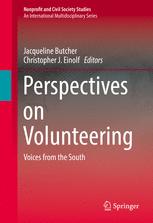

Most ebook files are in PDF format, so you can easily read them using various software such as Foxit Reader or directly on the Google Chrome browser.
Some ebook files are released by publishers in other formats such as .awz, .mobi, .epub, .fb2, etc. You may need to install specific software to read these formats on mobile/PC, such as Calibre.
Please read the tutorial at this link: https://ebookbell.com/faq
We offer FREE conversion to the popular formats you request; however, this may take some time. Therefore, right after payment, please email us, and we will try to provide the service as quickly as possible.
For some exceptional file formats or broken links (if any), please refrain from opening any disputes. Instead, email us first, and we will try to assist within a maximum of 6 hours.
EbookBell Team

5.0
30 reviewsThis volume overlooks the distinct expressions and awareness of volunteering in the lived reality of people from different regions of the world. By casting the net widely this book not only expands the geographic reach of experiences, models and case studies but also transcends the conventional focus on formal volunteering. It highlights institutional forms of volunteering specific to developing nations and also describes volunteering that is more loosely institutionalized, informal, and a part of solidarity and collective spirit. As a result this book provides a different look at the values, meaning, acts and expressions of volunteering.
The chapters in this book consist of essays and case studies that present recent academic research, thinking and practice on volunteering. Working from the premise that volunteering is universal this collection draws on experiences from Latin America, Africa including Egypt, and Asia. This book focuses on developing countries and countries in transition in order to provide a fresh set of experiences and perspectives on volunteering. While developing countries and countries in transition are in the spotlight for this volume, the developed country experience is not ignored. Rather the essays use it as a critical reference point for comparisons, allowing points of convergence, disconnect and intersection to emerge.